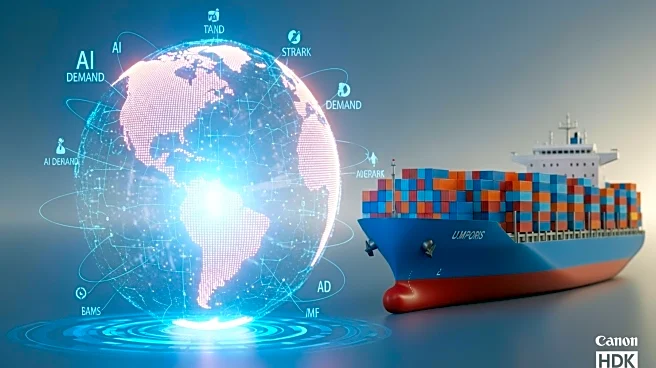What is the story about?
What's Happening?
The World Trade Organization (WTO) has significantly revised its forecast for global trade growth in goods for the current year, citing unexpected increases in AI-related purchases and a surge in U.S. imports. The WTO now predicts a 2.4% growth in merchandise trade, up from a previous forecast of 0.9% in August. This adjustment follows a strong first half of the year, driven by robust demand for semiconductors, servers, and telecommunications equipment. Additionally, the WTO noted a substantial increase in trade among developing countries, which has contributed to the overall growth. However, the forecast for 2026 has been lowered to 0.5%, reflecting potential challenges ahead.
Why It's Important?
The revised forecast highlights the significant impact of AI-related goods on global trade, with these products accounting for 42% of trade growth. This surge underscores the growing importance of technology in driving economic activity. The increase in U.S. imports, particularly in pharmaceuticals and precious metals, indicates a strategic move by importers to mitigate future tariff impacts. The WTO's adjustment also reflects the resilience of global trade amidst geopolitical tensions and tariff changes, particularly those introduced by the Trump administration. The growth in South-South trade further emphasizes the shifting dynamics in global commerce, with developing countries playing a more prominent role.
What's Next?
Looking ahead, the WTO's forecast suggests potential challenges in maintaining trade growth, with a lowered prediction for 2026. Stakeholders, including businesses and policymakers, may need to adapt to evolving trade dynamics, particularly in response to tariff changes and technological advancements. The continued demand for AI-related goods could drive further investment in technology sectors, while importers may continue to strategize around tariff policies. The role of developing countries in global trade is likely to expand, potentially reshaping trade relationships and economic strategies.
Beyond the Headlines
The focus on AI-related goods highlights the ethical and economic implications of technology-driven trade. As AI becomes more integrated into global commerce, issues such as data privacy, intellectual property, and workforce displacement may arise. The strategic responses to tariff changes also reflect broader geopolitical tensions, with potential long-term impacts on international trade policies and economic alliances.


















